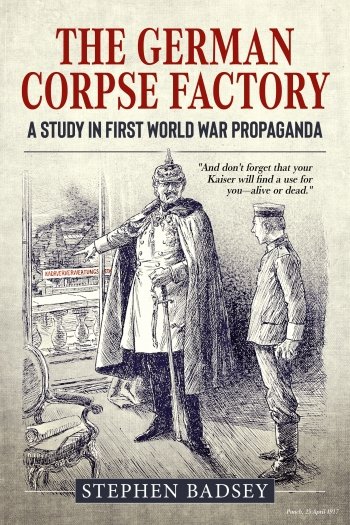-
Załączniki bezpieczeństwa
Załczniki do produktuZałączniki dotyczące bezpieczeństwa produktu zawierają informacje o opakowaniu produktu i mogą dostarczać kluczowych informacji dotyczących bezpieczeństwa konkretnego produktu
-
Informacje o producencie
Informacje o producencieInformacje dotyczące produktu obejmują adres i powiązane dane producenta produktu.HELION
-
Osoba odpowiedzialna w UE
Osoba odpowiedzialna w UEPodmiot gospodarczy z siedzibą w UE zapewniający zgodność produktu z wymaganymi przepisami.
'The German Corpse Factory' is one of the most famous and scandalous propaganda stories of the First World War. It has been repeated many times down to the present day as the prime example of the falsehood of British wartime propaganda. But despite all the attention paid to it, the full story has never been properly told. In Spring 1917, parts of the British press claimed that Germany was so short of essential fats and glycerine that the German Army was being forced to boil down the bodies of its own dead soldiers, causing a brief scandal of accusation and counter-accusation, including the claim that the story was the invention of the British official propaganda organisations. Behind the scenes, British propaganda experts opposed exploiting the story as it was obviously false, and contrary to their basic principles of never telling an obvious lie in an official statement. But at the time, the British government refused to deny that the 'German Corpse Factory' might really exist. In 1925 the scandal re-erupted in New York, when the former head of British military intelligence on the Western Front, in the United States on a speaking tour, was quoted in newspapers as having confessed to making the whole German Corpse Factory story up, a claim that he immediately denied. As a gesture of friendship on the occasion of the Locarno treaties, the British government now accepted the German government position that the story was a lie, but in fact neither government knew what had really happened in 1917. This book provides the answers to these questions according to the best historical evidence available. It uses the scandal of the 'German Corpse Factory' as a case-study to explore the true nature of British official propaganda and its organisations in the First World War, including the events of 1917 and who might really have been responsible for the story. It also shows how this brief episode was taken up by the German government after 1918, and by interest groups in Britain and the United States after 1925, to paint a false picture of British propaganda, with f ar-reaching consequences for the peace of Europe, and for our subsequent understanding of the First World War.
The German Corpse Factory made the list of "24 Best New Propaganda Books to Read in 2021" by Book Authority.








